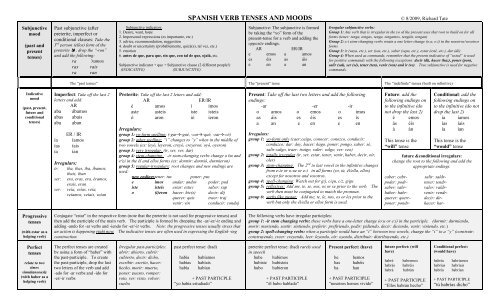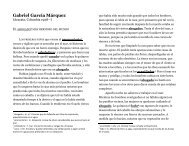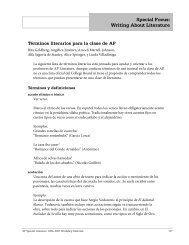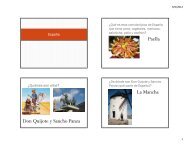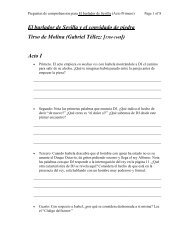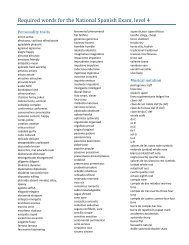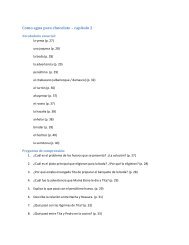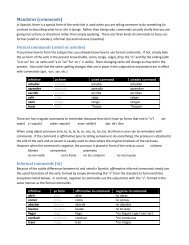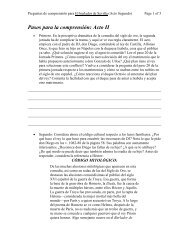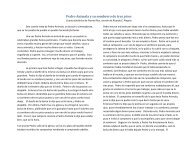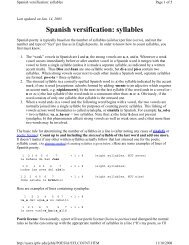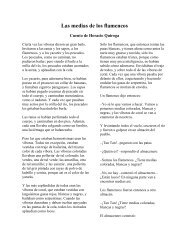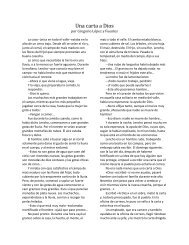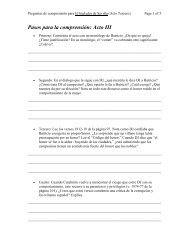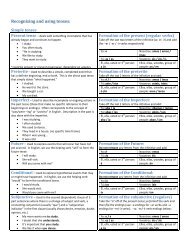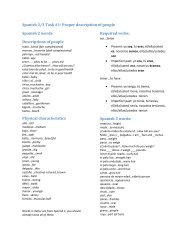SPANISH VERB TENSES AND MOODS - tatespanish.com
SPANISH VERB TENSES AND MOODS - tatespanish.com
SPANISH VERB TENSES AND MOODS - tatespanish.com
Create successful ePaper yourself
Turn your PDF publications into a flip-book with our unique Google optimized e-Paper software.
Subjunctive<br />
mood<br />
(past and<br />
present<br />
tenses)<br />
Past subjunctive (after<br />
preterite, imperfect or<br />
conditional clauses: Take the<br />
3 rd person (ellos) form of the<br />
preterite , drop the “-ron”<br />
and add the following:<br />
ra ’ramos<br />
ras rais<br />
ra ran<br />
Subjunctive indicators<br />
1. Desire, want, hope<br />
2. Impersonal expressions (es importante, etc.)<br />
3. advice, re<strong>com</strong>mendation, suggestion<br />
4. doubt or uncertainty (probablemente, quizá(s), tal vez, etc.)<br />
5. emotion<br />
6. antes de que, para que, sin que, con tal de que, ojalá, etc.<br />
Subjunctive indicator + que + Subjunctive clause (2 different people!)<br />
(INDICATIVE) (SUBJUNCTIVE)<br />
<strong>SPANISH</strong> <strong>VERB</strong> <strong>TENSES</strong> <strong>AND</strong> <strong>MOODS</strong> © 8/2009, Richard Tate<br />
Subjunctive: The subjunctive is formed<br />
by taking the “yo” form of the<br />
present-tense for a verb and adding the<br />
opposite endings.<br />
AR ER/IR<br />
e emos a amos<br />
es éis as áis<br />
e en a an<br />
Irregular subjunctive verbs:<br />
Group 1: Any verb that is irregular in the yo of the present uses that root to build on for all<br />
forms (tener: tenga, tengas, tenga, tengamos, tengáis, tengan)<br />
Group 2: e:i stem-changing verbs retain a one letter change (o:u, e:i) in the nosotros/vosotros<br />
forms<br />
Group 3: ir (vaya, etc.), ser (sea, etc.), saber (sepa, etc.), estar (esté, etc.), dar (dé)<br />
Group 4: When used as <strong>com</strong>mands, remember that the present indicative of “usted” is used<br />
for positive <strong>com</strong>mands with the following exceptions: decir (di), hacer (haz), poner (pon),<br />
salir (sal), ser (sé), tener (ten), venir (ven) and ir (ve). True subjunctive is used for negative<br />
<strong>com</strong>mands.<br />
The “past tenses” The “present” tense The “indefinite” tenses (built on infinitive)<br />
Indicative<br />
mood<br />
(past, present,<br />
future and<br />
conditional<br />
tenses)<br />
Imperfect: Take off the last 2<br />
letters and add:<br />
AR<br />
aba ábamos<br />
abas abais<br />
aba aban<br />
ía<br />
ías<br />
ía<br />
ER / IR<br />
íamos<br />
íais<br />
ían<br />
Irregulars:<br />
ir: iba, ibas, iba, íbamos,<br />
ibais, iban<br />
ser: era, eras, era, éramos,<br />
erais, eran<br />
ver: veía, veías, veía,<br />
veíamos, veíais, veían<br />
Preterite: Take off the last 2 letters and add:<br />
AR ER/IR<br />
é amos í imos<br />
aste asteis iste isteis<br />
ó aron ió ieron<br />
Irregulars:<br />
group 1: yo-form spelling: (-gar→-gué, -car→-qué, -zar→-cé)<br />
group 2: other spelling: “i” changes to “y” when in the middle of<br />
two vowels (ex: leyó, leyeron, creyó, creyeron, oyó, oyeron)<br />
group 3: very irregular. (ir, ser, ver, dar)<br />
group 4: stem-changing. -ir stem-changing verbs change ou and<br />
ei in the él and ellos forms (ex: dormir: durmió, durmieron)<br />
group 5: regular-irregulars: root changes and new endings are<br />
used:<br />
new endings tener: tuv poner: pus<br />
e imos andar: anduv poder: pud<br />
iste isteis estar: estuv saber: sup<br />
o (i)eron hacer: hic(z) decir: dij<br />
querer: quis traer: traj<br />
venir: vin conducir: conduj<br />
Present: Take off the last two letters and add the following<br />
endings:<br />
-ar -er -ir<br />
o amos o emos o imos<br />
as áis es éis es ís<br />
a an e en e en<br />
Irregulars:<br />
group 1: yo-form only (caer:caigo, conocer: conozco, conducir:<br />
conduzco; dar: doy, hacer: hago, poner: pongo, saber: sé,<br />
salir:salgo, traer: traigo, valer: valgo, ver: veo)<br />
group 2: totally irregular (ir, ser, estar, tener, venir, haber, decir, oír,<br />
oler)<br />
group 3: stem-changing. The 2 nd to last vowel in the infinitive changes<br />
from e:ie or o:ue or e:i in all forms (yo, tú, él/ella, ellos)<br />
except for nosotros and vosotros.<br />
group 4: spell-changing: Watch out for g/j, c/qu, c/z, g/gu<br />
group 5: reflexives: Add me, te, se, nos, os or se prior to the verb. The<br />
verb then must be conjugated to match the pronoun.<br />
group 6: verbs like gustar. Add me, te, le, nos, os or les prior to the<br />
verb but only the él/ella or ellos form is used.<br />
Future: add the<br />
following endings on<br />
to the infinitive (do<br />
not drop the last 2)<br />
é emos<br />
ás éis<br />
á án<br />
This tense is the<br />
“will” tense<br />
Conditional: add the<br />
following endings on<br />
to the infinitive (do not<br />
drop the last 2)<br />
ía íamos<br />
ías íais<br />
ía ían<br />
This tense is the<br />
“would” tense<br />
future &conditional irregulars:<br />
change the root to the following and add the<br />
appropriate endings.<br />
caber: cabr- salir: saldrpoder:<br />
podr- tener: tendrsaber:<br />
sabr- valer: valdrhaber:<br />
habr- venir: vendrquerer:<br />
querr- decir: dirponer:<br />
pondr- hacer: har-<br />
Progressive<br />
tenses<br />
(with estar as a<br />
helping verb)<br />
Conjugate “estar” in the respective form (note that the preterite is not used for progressive tenses) and<br />
then add the participle of the main verb. The participle is formed by dropping the -ar/-er/-ir ending and<br />
adding -ando for -ar verbs and -iendo for -er/-ir verbs. Note: the progressive tenses usually stress that<br />
an action is happening right now. The indicative tenses are often used in expressing the English -ing<br />
construction.<br />
The following verbs have irregular participles:<br />
group 1: -ir stem changing verbs: these verbs have a one-letter change (o:u or e:i) in the participle. (dormir: durmiendo,<br />
morir: muriendo, sentir: sintiendo, preferir: prefiriendo, pedir: pidiendo, decir: diciendo, venir: viniendo, etc.)<br />
group 2: spell-changing verbs: when a participle would have an “i” between two vowels, change the “i” to a “y” (construir:<br />
construyendo, creer: creyendo, leer: leyendo, oír: oyendo, distribuir: distribuyendo, etc.)<br />
Perfect<br />
tenses<br />
relate to two<br />
times<br />
simultaneously<br />
(with haber as a<br />
helping verb)<br />
The perfect tenses are created<br />
by using a form of “haber” with<br />
the past-participle. To create<br />
the past-participle, drop the last<br />
two letters of the verb and add<br />
-ado for -ar verbs and -ido for<br />
-er/-ir verbs<br />
Irregular past-participles:<br />
abrir: abierto, cubrir:<br />
cubierto, decir: dicho,<br />
escribir: escrito, hacer:<br />
hecho, morir: muerto,<br />
poner: puesto, romper:<br />
roto, ver: visto, volver:<br />
vuelto<br />
past perfect tense: (had)<br />
había<br />
habías<br />
había<br />
habíamos<br />
habíais<br />
habían<br />
+ PAST PARTICPLE<br />
“yo había estudiado”<br />
preterite perfect tense: (had) rarely used<br />
in speech<br />
hube hubimos<br />
hubiste hubisteis<br />
hubo hubieron<br />
+ PAST PARTICIPLE<br />
“él hubo hablado”<br />
Present perfect: (have)<br />
he hemos<br />
has habéis<br />
ha han<br />
+ PAST PARTICIPLE<br />
“nosotros hemos vivido”<br />
future perfect: (will<br />
have)<br />
habré habremos<br />
habrás habréis<br />
habrá habrán<br />
+ PAST PARTICIPLE<br />
“Ellos habrán hecho”<br />
Conditional perfect:<br />
(would have)<br />
habría habríamos<br />
habrías habríais<br />
habría habrían<br />
+ PAST PARTICIPLE<br />
“tú habrías dicho”
Chart of regular and irregular verbs in the “yo” form (only). Remember, most tenses (except preterite) simply add “‐s, ‐mos or ‐n” to change the person.<br />
present preterite imperfect future / cond. Progressive subjunctive past posivite tú <strong>com</strong>mand<br />
subjunctive<br />
REGULAR <strong>VERB</strong>S<br />
<strong>com</strong>prar <strong>com</strong>pro <strong>com</strong>pré <strong>com</strong>praba <strong>com</strong>praré / estoy<br />
<strong>com</strong>pre <strong>com</strong>prara <strong>com</strong>pra / no <strong>com</strong>pres<br />
<strong>com</strong>praría <strong>com</strong>prando<br />
vender vendo vendí vendía venderé / estoy vendiendo venda vendiera vende / no vendas<br />
vendería<br />
escribir escribo escribí escribía escribiré / estoy escribiendo escriba escribiera escribe / no escribas<br />
escribiría<br />
IRREGULAR <strong>VERB</strong>S<br />
1. ser ( to be) soy fui era ** sea fuera sé / no seas<br />
2. estar (to be) estoy estuve ** esté estuviera<br />
3. ir (to go) voy fui iba estoy yendo vaya fuera ve / no vayas<br />
4. haber (to have – he hube habré / habría ** haya hubiera<br />
helping verb)@@@<br />
5. leer ( to read)<br />
## (i:y) estoy leyendo leyera<br />
6. decir (to say) digo dije diré / diría estoy diciendo diga dijera di / no digas<br />
7. poder (to be able to) puedo pude podré / podría ** pueda pudiera<br />
8. poner (to put) pongo puse pondré / pondría ponga pusiera pon / no pongas<br />
9. saber (to know) sé supe sabré / sabría sepa supiera<br />
10. tener (to have) tengo tuve tendré / tendría tenga tuviera ten / no tengas<br />
11. ver (to see) veo vi veía vea viera<br />
12. venir (to <strong>com</strong>e) vengo vine vendré / vendría estoy viniendo venga viniera ven / no vengas<br />
13. hacer (to do / make) hago hice haré / haría haga hiciera haz / no hagas<br />
14. querer (to want) quiero quise querré / querría quiera quisiera<br />
15. dormir (to sleep) duermo ## ( stem) estoy durmiendo duerma durmiera<br />
16. pedir (to ask for) pido ## (stem) estoy pidiendo pida pidiera<br />
17. jugar (to play) juego jugué juegue jugara<br />
18. tocar (to touch/play) toqué toque tocara<br />
19. dar (to give) doy di dé diera<br />
20. salir (to leave) salgo saldré / saldría salga saliera sal / no salgas<br />
** not used ## irregular in other forms besides “yo”<br />
Blank boxes mean that the verb is conjugated according to the regular pattern in that mood/tense<br />
@@@Irregular past participles: (after haber) –<br />
abrir (to open) - abierto (open), cubrir (to cover) - cubierto (covered), decir (to say) - dicho (said), escribir (to write) - escrito (written),<br />
freír (to fry) - frito (fried), hacer (to do) - hecho (done), morir (to die) - muerto (dead), poner (to put) - puesto (put), resolver (to resolve) - resuelto (resolved),<br />
romper (to break) - roto (broken), ver (to see) - visto (seen), volver (to return) - vuelto (returned)


